含有be动词变否定句,一般疑问句
含有be动词的一般现在时否定句和疑问句的变化规律
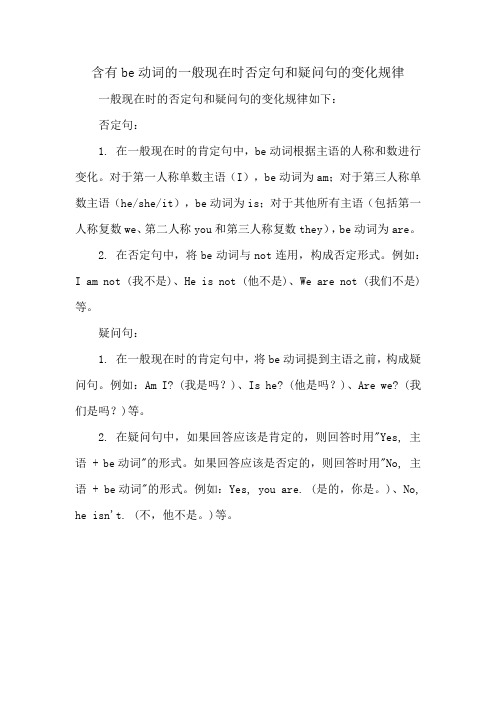
含有be动词的一般现在时否定句和疑问句的变化规律
一般现在时的否定句和疑问句的变化规律如下:
否定句:
1. 在一般现在时的肯定句中,be动词根据主语的人称和数进行变化。
对于第一人称单数主语(I),be动词为am;对于第三人称单数主语(he/she/it),be动词为is;对于其他所有主语(包括第一人称复数we、第二人称you和第三人称复数they),be动词为are。
2. 在否定句中,将be动词与not连用,构成否定形式。
例如:
I am not (我不是)、He is not (他不是)、We are not (我们不是)等。
疑问句:
1. 在一般现在时的肯定句中,将be动词提到主语之前,构成疑问句。
例如:Am I? (我是吗?)、Is he? (他是吗?)、Are we? (我们是吗?)等。
2. 在疑问句中,如果回答应该是肯定的,则回答时用"Yes, 主语 + be动词"的形式。
如果回答应该是否定的,则回答时用"No, 主语 + be动词"的形式。
例如:Yes, you are. (是的,你是。
)、No, he isn't. (不,他不是。
)等。
否定句及一般疑问句
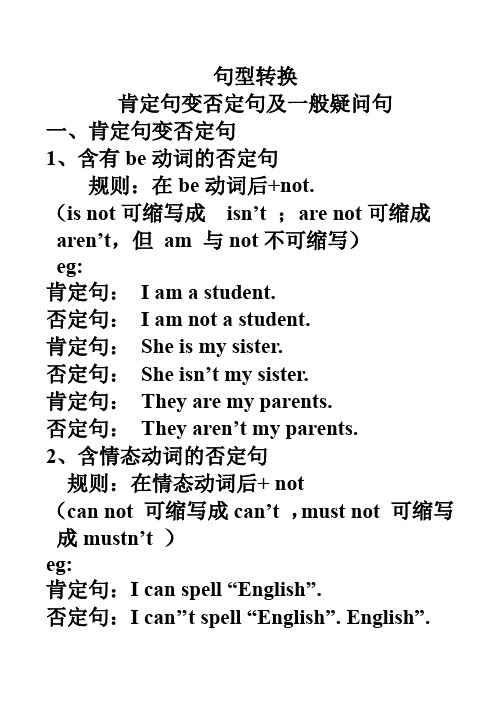
句型转换肯定句变否定句及一般疑问句一、肯定句变否定句1、含有be动词的否定句规则:在be动词后+not.(is not可缩写成isn’t ;are not可缩成aren’t,但am 与not不可缩写)eg:肯定句:I am a student.否定句:I am not a student.肯定句:She is my sister.否定句:She isn’t my sister.肯定句:They are my parents.否定句:They aren’t my parents.2、含情态动词的否定句规则:在情态动词后+ not(can not 可缩写成can’t ,must not 可缩写成mustn’t )eg:肯定句:I can spell “English”.否定句:I can’’t spell “English”.English”.肯定句:I must find it.否定句:I mustn’t find it.3、含有实义动词的句子的否定句构成(1)第三人称单数做主语。
(he、she、it或表示单个人或物的第三人称名词)规则:要在行为动词前加上助动词doesn’t,然后将动词恢复原形。
eg :肯定句:He has a soccer ball.否定句:He doesn’t have a soccer ball.(2)其它人称做主语规则:在行为动词前加don’t ,句子中的行为动词用原形。
eg:肯定句:They like bananas.否定句:They don’t like bananas.注:(1)在变否定句时,如遇some应变any Here are some books.Here aren’t any books.二、肯定句变一般疑问句1、含有be动词的句子变一般疑问句规则:把be动词提至句首,第一人称变第二人称,句末句号变问号。
(I/we变成youMy/our变成your)肯定句:I am a student.一般疑问句:Are you a student?肯定句:She is my sister.一般疑问句:Is she your sister?肯定句:They are my parents.一般疑问句:Are they your parents?2、含有情态动词的句子变一般疑问句规则:把情态动词提至句首,第一人称变第二人称,句末句号变问号。
初一英语上册:含be动词一般疑问句考点
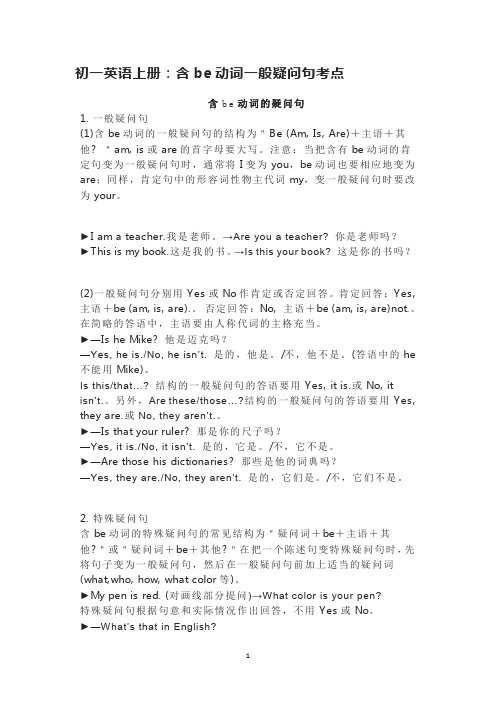
初一英语上册:含be动词一般疑问句考点含be动词的疑问句1. 一般疑问句(1)含be动词的一般疑问句的结构为"Be (Am, Is, Are)+主语+其他? "am, is或are的首字母要大写。
注意:当把含有be动词的肯定句变为一般疑问句时,通常将I变为you,be动词也要相应地变为are;同样,肯定句中的形容词性物主代词my,变一般疑问句时要改为your。
►I am a teacher.我是老师。
→Are you a teacher? 你是老师吗?►This is my book.这是我的书。
→Is this your book? 这是你的书吗?(2)一般疑问句分别用Yes或No作肯定或否定回答。
肯定回答:Yes, 主语+be (am, is, are).。
否定回答:No, 主语+be (am, is, are)not.。
在简略的答语中,主语要由人称代词的主格充当。
►—Is he Mike? 他是迈克吗?—Yes, he is./No, he isn’t. 是的,他是。
/不,他不是。
(答语中的he 不能用Mike)。
Is this/that…? 结构的一般疑问句的答语要用Yes, it is.或No, it isn’t.。
另外,Are these/those…?结构的一般疑问句的答语要用Yes, they are.或No, they aren’t.。
►—Is that your ruler? 那是你的尺子吗?—Yes, it is./No, it isn’t. 是的,它是。
/不,它不是。
►—Are those his dictionaries? 那些是他的词典吗?—Yes, they are./No, they aren’t. 是的,它们是。
/不,它们不是。
2. 特殊疑问句含be动词的特殊疑问句的常见结构为"疑问词+be+主语+其他?"或"疑问词+be+其他?"在把一个陈述句变特殊疑问句时,先将句子变为一般疑问句,然后在一般疑问句前加上适当的疑问词(what,who, how, what color等)。
含有be动词的一般现在时否定句和疑问句的变化规律

含有be动词的一般现在时否定句和疑问句的变化规律一般现在时的否定句和疑问句的变化规律如下:否定句:在句子中加入否定副词“not”,并将be动词直接放在主语之后。
例如:She is not happy.(她不快乐。
)疑问句:将be动词提到句子的主语之前,并在句末加上问号。
例如:Are you ready?(你准备好了吗?)30句双语例句:1. She is not here.(她不在这里。
)2. Are you ready?(你准备好了吗?)3. He is not coming to the party.(他不来参加派对。
)4. Is she your sister?(她是你的妹妹吗?)5. They are not happy with the result.(他们对结果不满意。
)6. Are you from Canada?(你来自加拿大吗?)7. It is not a secret.(这不是个秘密。
)8. Are they your friends?(他们是你的朋友吗?)9. We are not going to the beach.(我们不去海滩。
)10. Is it cold outside?(外面冷吗?)11. The food is not delicious.(这食物不好吃。
)12. Are you a student?(你是学生吗?)13. She is not feeling well.(她感觉不舒服。
)14. Is he a teacher?(他是老师吗?)15. They are not listening to the music.(他们不听音乐。
)16. Are they watching a movie?(他们在看电影吗?)17. We are not happy with the service.(我们对服务不满意。
)18. Is it raining outside?(外面在下雨吗?)19. The cat is not sleeping.(猫没有睡着。
初一否定句-一般疑问句和特殊疑问句讲解
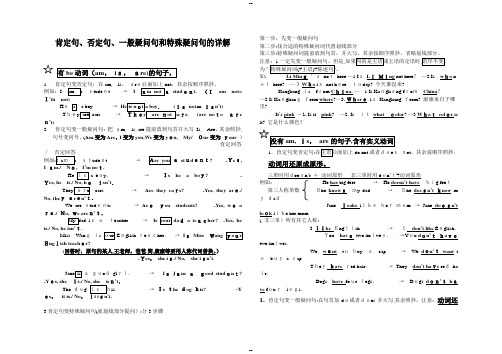
肯定句、否定句、一般疑问句和特殊疑问句的详解1.am, is , ar,其余按顺序照抄。
例如:I stude nt. → I stud ent. (I amnot=I’mnot)H e a boy. →not = isn ’t)T hecars. → rs. (are no t= are n’t)2. 肯定句变一般疑问句:把 am, is, are 提前放到句首并大写 Is, Are ,其余照抄,句号变问号。
(Am 变为Are ,I 变为you,We 变为y ou, My/ Our 变为 your )肯定回答/ 例如 stude nt. → a st ud ent? -Ye s,I am./ N t.He a b oy .→ Is he a bo y? -Yes, he is./ No, h e isn ’t . cars. → Are they ca rs? -Yes, they ar e./No, the yWe are stud ents. → Ar e you students? -Yes, w e a re./ No, we are n’t.i s a teacher. →da d a te acher? -Yes, he is./ No, he isn ’t. Miss Wan g is E nglish te acher . → I s Miss Wang Eng lish teach er? (回答时,原句的某人,王老师,爸爸,简,康康等要用人称代词替换。
)-Yes , she i s./ No, she i sn ’t. a goo d gi rl.→ I s J ane a good stud en t? -Y es, she in’t . The dog is . → Is the dog his? –Y es , it is./ No , it i sn ’t.3.肯定句变特殊疑问句(就划线部分提问):分3步骤第一步:先变一般疑问句第二步:找合适的特殊疑问词代替划线部分第三步:特殊疑问词提前放到句首,并大写,其余按顺序照抄,省略划线部分。
be 动词在否定句和疑问句的用法

be 动词在否定句和疑问句的用法be动词在否定句和疑问句中的用法如下:1.否定句:be动词与not连用,构成否定形式。
例如:He is not here.他不在这里。
解释:表达某人或某物不在某个地方。
2.疑问句:将be动词提前形成疑问句。
例如:Is he here?他在这里吗?解释:用来询问某人或某物是否在某个地方。
3.否定句:be动词加not构成否定疑问句。
例如:Isn't he here?他不在这里吗?解释:表达疑问之情态。
以下是24个双语例句:1. She is not happy.她不快乐。
2. Are you tired?你累了吗?3. He is not tall.他不高。
4. Is she your sister?她是你的姐姐吗?5. They are not at home.他们不在家。
6. Is it cold outside?外面冷吗?7. I am not ready yet.我还没准备好。
8. Are they friends?他们是朋友吗?9. We are not hungry.我们不饿。
10. Is he a doctor?他是医生吗?11. She is not wearing a dress.她没有穿裙子。
12. Are you busy?你忙吗?13. He is not a good student.他不是一个好学生。
14. Is she from Australia?她来自澳大利亚吗?15. They are not happy with the result.他们对结果不满意。
16. Is it your book?这是你的书吗?17. I am not sure about the answer.我不确定答案。
18. Are they siblings?他们是兄弟姐妹吗?19. We are not going to the party.我们不去参加派对。
be动词引导的否定句和一般疑问句英语七年级上册语法-

Grammar be动词引导的否定句和一般疑问句➢疑问句是用于提出疑问的句子,一般疑问句是疑问句中的一种,翻译为“......吗?”➢陈述句:She is a teacher.否定句:She is not a teacher. = She isn’t a teacher.➢be动词随主语的变化而变化:当主语是三单和不可数名词时be动词用is , 当主语是非三单时用are 。
找出下列陈述句中的主语并改为一般疑问句:1)I am a student. 改为一般疑问句:2)We are playing basketball. 改为一般疑问句:3)You are a handsome boy. 改为一般疑问句:4)She is Adam’s sister. 改为一般疑问句:5)He is a policeman. 改为一般疑问句:6)It is an English book. 改为一般疑问句:7)They are lions. 改为一般疑问句:8)This is a book.改为一般疑问句:9)That is a book.改为一般疑问句:10)These are apples.改为一般疑问句:11)Those are apples.改为一般疑问句:➢一般疑问句的回答方式:用Yes / No作肯定或否定回答,再看用什么问就用什么答。
——A:Are you a student?——B:Yes, I am.(肯定回答)/ No, I’m not.(否定回答)——A:Is he / she / Peter / your father / your mother a teacher?——B:(肯定回答)/ (否定回答)——A:Are they / these / those / the apples ...?——B:(肯定回答)/ (否定回答)——A:Is it / this / that / the apple / the dog ...?——B:(肯定回答)/ (否定回答)一般疑问句专项练习Name:一、将陈述句改为一般疑问句1.I am a pupil(小学生).2.Lily is an English teacher.3.This is your pen.4.Those are your books.5.These are my pens.二、对一般疑问句进行回答1.——Are you eight?——Yes, / No, 2.——Are they students?——/ 3.——Is that her pet?——/ 4.——Is he Fan Chengcheng?——/ 5.——Are those apples?——/ 6.——Is your mother a nurse?——/三、把下列陈述句改为否定句一般疑问句并做出回答1.This is our classroom.否定句:一般疑问句:肯定回答:否定回答:2.She is Miss Smith.否定句:一般疑问句:肯定回答:否定回答:3.I am in China.否定句:一般疑问句:肯定回答:否定回答:4.Miss Zhang is our English teacher.否定句:一般疑问句:肯定回答:否定回答:5.Tom is under the tree.否定句:一般疑问句:肯定回答:否定回答:6.Tom and Tim are good friends.否定句:一般疑问句:肯定回答:否定回答:。
be动词、变复数、否定句、一般疑问句练习题
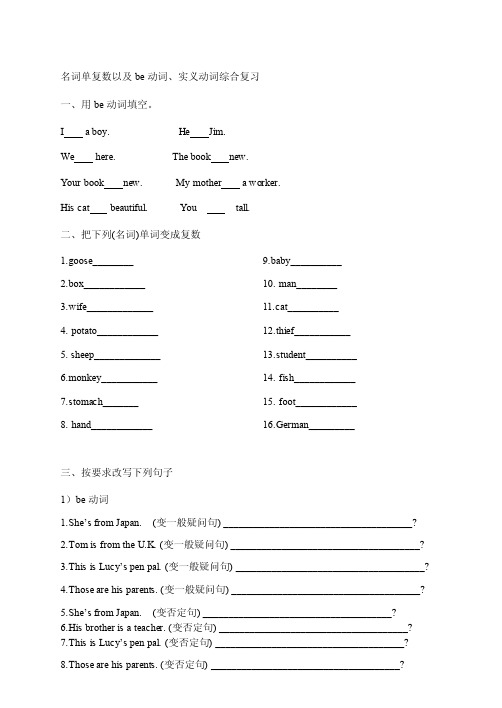
名词单复数以及be动词、实义动词综合复习一、用be动词填空。
I a boy. He Jim.We here. The book new.Your book new. My mother a worker. His cat beautiful. You tall.二、把下列(名词)单词变成复数1.goose________2.box____________3.wife_____________4. potato____________5. sheep_____________6.monkey___________7.stomach_______8. hand____________ 9.baby__________10. man________11.cat__________12.thief___________13.student__________14. fish____________15. foot____________16.German_________三、按要求改写下列句子1)be动词1.She’s from Japan.(变一般疑问句) _____________________________________?2.Tom is from the U.K. (变一般疑问句) _____________________________________?3.This is Lucy’s pen pal. (变一般疑问句) _____________________________________?4.Those are his parents. (变一般疑问句) _____________________________________?5.She’s from Japan.(变否定句) _____________________________________?6.His brother is a teacher. (变否定句) _____________________________________?7.This is Lucy’s pen pal. (变否定句) _____________________________________?8.Those are his parents. (变否定句) _____________________________________?9.There are many countries in the world. (变否定句) _______________________________?10.Pandas are very cute. (变否定句) _____________________________________?11..Lingling is very quiet. (变否定句) _ ____________________________________?12..She’s from Japan. (提问) _____________________________________?13.His brother is a teacher. (提问) _____________________________________?14.Tom is my teacher . (提问) _____________________________________?15.My shoes are 20 yuan . (提问) _______________________________?16.This is a pen . (提问) _____________________________________?17.His favourite(最喜欢的subject(科目)is math(数学). (提问)__________________________________?18.I’m 14 years old. (提问) _____________________________________?19.The ruler is on the table. (提问) _____________________________________?20.The bank is across from(在对面)the park. (提问) _________________________?21.The pay phone is on CENTER ST. (提问) ________________________________?22.My house is on a busy(繁华的)street. (提问) _________________________________?23.My name is Andy. (提问) _____________________________________?2)实义动词1. I like English very much. (变否定句) _ ____________________________________?2. Jim lives in Tokyo. (变否定句) _____________________________________?3.I want to see the pandas. (变否定句) _____________________________________?4. He comes from Japan. (变否定句) _____________________________________?5..He goes to school by bus. (变一般疑问句) _____________________________________?6..I want to see films. (变一般疑问句) _____________________________________?7..Tom has a beautiful sister. (变一般疑问句)_____________________________________?8.I get up at 7 o’clock. (变一般疑问句) _____________________________________?9.I like English very much. (变一般疑问句) ________________________________?10.Jim lives in Tokyo. (变一般疑问句) ________________________________?11.. Jim wants to see the pandas. (变一般疑问句) ________________________________?12. He comes from Japan. (变一般疑问句) _ _______________________________?13.. Lucy has a brother. (变一般疑问句) ________________________________?14. I want to go to Changchun with my friends. (变一般疑问句)__________________________?15.. They want to go shopping on the weekend. (变一般疑问句)___________________________?16.She likes to play with her friends. (变一般疑问句)_______________________________?17.Tom often watches TV in the evening. (变一般疑问句) ________________________________?18.Koala sleeps during the day. (变一般疑问句) ________________________________?19..Koalas get up and eat leaves at night. (变一般疑问句)________________________________?20..They want to go shopping this afternoon. (变一般疑问句)________________________________?21..Tom wants to do homework now. (变一般疑问句)________________________________?22. I need many pens. (变一般疑问句) ________________________________?23.. Elephant likes to eat grass. (变一般疑问句) ________________________________?24. Lucy likes apples. (变一般疑问句) ________________________________?12月19日阅读理解补充练习John is six years old. He can read and write well. But he can`t tell the time. His mother, Mrs Brown teaches him many times, but he still can`t tell. He would say “breakfast time”, “lunchtime”and “teatime”instead of (代替) saying eight o`clock, twelve o`clock and four o`clock in the afternoon. His mother doesn`t know how to help him.One day John`s aunt, Mary comes to see his mother. His mother tell her about that. His aunt says. “Let me help you. I think I can help him.”When John comes home after school, Mary begins (开始) to teach him..“Can you count,John ?” she asks him.“Y es. One ,two three,four …”John says.“That`s fine. Now I put the long hand (钟表的长指针) on twelve and the short hand on one -that is one o`clock. If I put the short hand on two, what is the time?’’“Two o`clock.”“Good. And on three?”“Three o`clock.”Then it is four o`clock in the afternoon, and John`s aunt asks him, “What time is it now ,John?”“Teatime, Aunt, and I am very hungry (饥饿).” John looks at the clock and answers. ( ) 1. John `s mother can`t teach him to __________.A. readB. writeC. tell the time( ) 2. When it`s twelve o`clock John says it`s __________.A. breakfasttimeB. lunchtimeC. teatime( ) 3. The word “count” may mean (意思是) ____________.A. 计算B. 数数C. 认为( ) 4. The long hand is on twelve, and the short hand is on five. What`s the time?A. It`s twelveB. It`s fiveC. It`s four( ) 5. From the text (文章), we know _______.A. John says teatime instead of four o`clock in the afternoon.B. John has a nice watch (手表).C. There is something wrong with John`s watch.。
- 1、下载文档前请自行甄别文档内容的完整性,平台不提供额外的编辑、内容补充、找答案等附加服务。
- 2、"仅部分预览"的文档,不可在线预览部分如存在完整性等问题,可反馈申请退款(可完整预览的文档不适用该条件!)。
- 3、如文档侵犯您的权益,请联系客服反馈,我们会尽快为您处理(人工客服工作时间:9:00-18:30)。
含有be动词变否定句,一般疑问句
1.She’s from Japan.
变否定句____________________________________
变一般疑问句_____________________________________肯定/否定回答____________________________________ is from the .
变否定句____________________________________
变一般疑问句_____________________________________肯定/否定回答____________________________________
3.This is Lucy’s pen pal.
变否定句____________________________________
变一般疑问句_____________________________________肯定/否定回答____________________________________
4.Those are his parents.
变否定句____________________________________
变一般疑问句_____________________________________肯定/否定回答____________________________________
5.Singapore is a very interesting country.
变否定句____________________________________
变一般疑问句_____________________________________肯定/否定回答____________________________________
6.There are many countries in the world.
变否定句____________________________________
变一般疑问句_____________________________________肯定/否定回答____________________________________ are very cute.
变否定句____________________________________
变一般疑问句_____________________________________肯定/否定回答____________________________________
8.His favourite subject is math.
变否定句____________________________________
变一般疑问句_____________________________________肯定/否定回答____________________________________ 9.I’m 14 years old.
变否定句____________________________________
变一般疑问句_____________________________________肯定/否定回答____________________________________ 10.It’s rainy in August.
变否定句____________________________________
变一般疑问句_____________________________________肯定/否定回答____________________________________ 11.My favourite food is hot dog.
变否定句____________________________________
变一般疑问句_____________________________________肯定/否定回答____________________________________ 12.I learn English by myself.
变否定句____________________________________
变一般疑问句_____________________________________肯定/否定回答____________________________________ 13.We are best friends.
变否定句____________________________________
变一般疑问句_____________________________________肯定/否定回答____________________________________。
